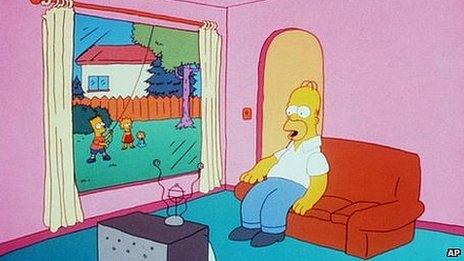Will proper pay rises soon be affordable?
- Published
- comments

Have we become a nation of Homer Simpsons?
Ask any economist (ie, not me - don't ever forget I am a hack) and they'll say it is impossible to have any meaningful improvement in living standards without any improvement in productivity.
Which is why it has been slightly nerve-wracking, after all those years that we've been getting poorer, that the recent economic recovery has been accompanied by only the smallest improvements in output per hour worked or output per worker.
But just perhaps there's a glimmer that you and I are beginning to generate more revenue for the same toil and graft (actually I am not sure whether I am, but I have no doubt that your efficiency is on the up).
Figures out this morning showed that in the last three months of the year, output per worker was 1.3% greater than in the same period of the previous year, and output per hour worked was 0.7% per cent higher.
A golden age?
OK this is not exactly a return to a golden age. It is important to recall that between 1998 to 2007, productivity improved at an annual rate of 2.5% per annum, fuelling economic growth at a similar tempo and rising prosperity.
But the reason the latest nudge up in productivity may be a bit of a breakthrough is that it caps a year of gentle improvements, after 18 months, from the middle of 2011 to the end of 2012, when there was no improvement in productivity at all.
Why has productivity been so lousy since the crash, with output per hour worked almost 5% below where it was in the first quarter of 2008?
Well what happened after the Crash and deep recession of 2008 - which many would see as a good thing - is that businesses retained workers on their books to a far greater extent than was true in previous recessions.
So as a matter of arithmetic inevitability, productivity fell sharply.
And then, curiously, in the long years of stagnation, companies started to hire again - which again meant that productivity fell, by definition.
More recently, as a recovery took hold, hiring accelerated. Productivity improved, but not by very much.
A nation of Homer Simpsons?
But why on earth, you may ask, are companies hiring, rather than making their existing workers work harder and smarter?
Have we become a nation of Homer Simpsons, fat, lazy and dim?
And for the avoidance of doubt, this is a British phenomenon. Productivity has risen faster in competitor nations. The gap between UK productivity and those of the G7 major industrial nations (excluding Britain) is more than a fifth.
Or to put it another way, we are more than a fifth less efficient than the US, Germany, France and so on (productivity in France, an economy usually sneered at by British business leaders, is well over 30% greater than in the UK).
What has gone wrong?
Puzzled economists (them again) posit a number of explanations.
Often they blame our weakened banks, for failing to provide finance to younger, riskier businesses with potentially better prospects.
Or they point to the banks keeping weak or zombie companies alive, a practice that appeared to be socially benign, which propped up irredeemably weak businesses that ought perhaps to have been put out of their misery - such that the capital locked up in them could have been redeployed to more productive outfits.
Or they say that something has gone wrong with companies' ability to exploit new technologies properly.
Or they argue that the recession undermined the confidence of companies to such an extent that they simply stopped investing in productive new kit and productivity.
Or the economists shrug and say they don't really have a clue what's been going on.
A one-off step change
For what it's worth, when I talk to company bosses they paint a different picture.
They insist that they are continuing to make great productivity strides, in the sense that their people are working harder and more intelligently than ever.
But they say they fight a constant battle against deflation, falling prices for their goods and services. They say they sell more stuff for less revenue, and that they simply can't improve the efficiency of their people fast enough to offset this squeeze in income.
Which implies they are prepared to take a smaller profit for unit sold to generate greater sales in the long term. So maybe the fall in officially measured whole-economy productivity is a one off step change in a downward direction, which will soon be reversed.
We should probably all hope that's the case.
Because quite apart from that inescapable link between productivity and our living standards, unless productivity starts to improve soon, there is likely to be a tightening in the labour market - which could lead to wage rises viewed by the Bank of England as inflationary.
Which would mean a premature, yucky and potentially recovery-stifling rise in interest rates.